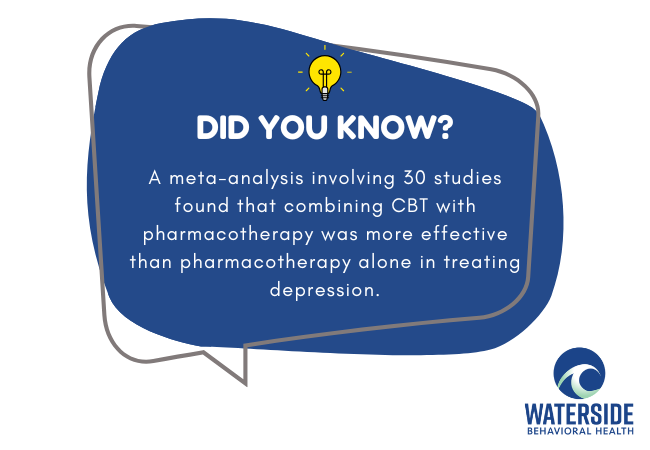Mental health treatment has evolved far beyond a one-size-fits-all approach. Today, the most effective recovery paths are multidimensional—combining a range of therapies to address the complexity of each person’s emotional, psychological, and behavioral needs. Among these, cognitive-behavioral therapy (CBT) remains one of the most widely used and effective tools in the modern therapeutic toolkit. But CBT doesn’t exist in isolation. In many cases, it becomes even more impactful when combined with other therapeutic approaches.
Understanding how CBT works alongside other modalities can offer hope and direction for those seeking lasting healing. When thoughtfully integrated into a comprehensive mental health plan, CBT provides a strong foundation for emotional resilience and behavioral change—while other therapies add depth, nuance, and specialized support.
The Core of CBT: Rewiring Thoughts and Behaviors
At its heart, CBT is designed to help people recognize and challenge distorted thinking patterns that contribute to emotional distress. These cognitive distortions—like catastrophizing, black-and-white thinking, or assuming the worst—can drive harmful behaviors and reinforce anxiety, depression, and low self-worth. Through structured exercises, reflection, and targeted homework, CBT helps individuals learn how to identify these patterns and reframe them into more balanced, constructive thoughts.
This framework is especially powerful in providing immediate, action-oriented relief. But emotional healing doesn’t stop with cognition. Lasting recovery often requires exploring deeper emotional wounds, developing new coping mechanisms, and addressing underlying trauma. That’s why CBT is frequently combined with other evidence-based therapies in Mental Health Treatment Programs Massachusetts—to offer well-rounded, effective care.
The Synergy Between CBT and Dialectical Behavior Therapy
One of the most natural pairings with CBT is Dialectical Behavior Therapy in Massachusetts. Originally developed to treat borderline personality disorder, DBT emphasizes emotional regulation, interpersonal effectiveness, distress tolerance, and mindfulness. While CBT focuses heavily on changing thoughts to influence behavior, DBT acknowledges the emotional intensity many people experience and teaches them how to accept and navigate those feelings without becoming overwhelmed.
When used together, CBT and DBT create a powerful synergy: CBT helps change unhelpful thinking, while DBT supports the emotional capacity to sit with discomfort and tolerate distress. For example, someone struggling with panic attacks might use CBT techniques to reframe catastrophic thoughts and DBT tools to regulate their breathing and self-soothe through the moment. The combination strengthens both thought and emotion management—an essential pairing for sustainable mental health recovery.
Integrating Trauma Therapy for Deeper Healing
Many individuals seeking treatment for anxiety, depression, or emotional instability also carry unresolved trauma. This trauma, whether it stems from childhood neglect, abuse, loss, or other difficult life events, often lives in the body and nervous system—beyond just cognitive patterns. That’s why incorporating Trauma Therapy in Massachusetts is critical in many recovery plans.
Trauma therapy helps individuals access and process painful memories and emotional wounds in a safe, structured environment. While CBT equips clients with tools to address daily challenges and thought distortions, trauma-focused care goes deeper, helping them unpack and release the emotional weight that fuels these patterns in the first place.
In treatment plans that involve both CBT and trauma therapy, clients might work on current stressors and automatic negative thoughts during one session and then explore unresolved past events that continue to shape those thoughts in another. This dual approach leads to a more comprehensive healing experience—where immediate symptoms are managed while deeper emotional wounds are gradually resolved.
Managing Depression and Anxiety with CBT and Complementary Care
For those battling persistent feelings of sadness, hopelessness, or emptiness, Depression Therapy in Massachusetts often integrates CBT to tackle the negative self-talk and behavioral inertia that can define the condition. Depressed individuals often experience cognitive distortions like “I’m worthless,” or “Nothing will ever get better.” CBT helps dismantle these thoughts, but therapists may also introduce behavioral activation—encouraging patients to engage in small, positive actions that reinforce a sense of accomplishment and joy.
At the same time, depressive symptoms may be rooted in unresolved grief, chronic stress, or unhealed trauma—areas that other therapeutic approaches are better suited to address. For example, in addition to CBT, some individuals benefit from narrative therapy, psychodynamic therapy, or expressive therapies like art or movement. When CBT is part of a layered approach, clients experience both the immediate benefits of structured problem-solving and the deeper healing offered by emotional exploration.
The same is true for those receiving Anxiety Treatment in Massachusetts. CBT remains the gold standard for managing generalized anxiety, social phobia, and panic disorders—but its effects are enhanced when combined with tools like mindfulness meditation, breathing exercises, and somatic work. This combination addresses both the cognitive and physical components of anxiety—resulting in more thorough, lasting relief.

The Role of a Structured Treatment Environment
One of the most effective ways to combine these therapies is through admission into a Mental Health Treatment Center in Massachusetts. These structured environments provide a team-based approach, where licensed professionals collaborate to deliver multiple therapies in an integrated, coordinated manner. In these settings, clients may participate in daily CBT groups, individual trauma therapy sessions, mindfulness-based activities, and skills training drawn from DBT and other modalities.
In addition to therapy, treatment centers offer consistency, accountability, and community—elements that are hard to replicate in outpatient or self-guided care. For someone overwhelmed by multiple symptoms or struggling with motivation, this comprehensive support structure can be the key to stabilizing and beginning the recovery process.
A mental health treatment center also facilitates personalized care plans that evolve as the client progresses. While CBT may be the starting point, as symptoms lessen, new therapies can be introduced to deepen growth, maintain progress, or target emerging issues. This flexibility and responsiveness are vital to long-term success.
Why Combining Therapies Works Better Than One-Track Approaches
Mental health is complex—shaped by biology, environment, experiences, and habits. That complexity demands a treatment approach that is equally nuanced. CBT offers structure, clarity, and empowerment. Other therapies offer depth, acceptance, and emotional exploration. Together, they form a complete picture—addressing both the mind’s patterns and the heart’s pain.
At Waterside Behavioral Health, we believe in building personalized treatment plans that reflect the uniqueness of every individual. Whether you’re navigating long-term depression, acute anxiety, unresolved trauma, or a mix of emotional challenges, our goal is to help you access a full range of tools that work together to support lasting change.
Why Choose Us?
At Waterside Behavioral Health, we believe that mental health treatment should be as dynamic and individualized as the people we serve. Our center stands apart because we offer a fully integrative model of care that seamlessly blends the structure of Cognitive-Behavioral Therapy in Massachusetts with a wide range of complementary evidence-based approaches. We understand that CBT provides a solid foundation for managing symptoms and building coping skills—but we also recognize that not every emotional struggle can be resolved through thought correction alone.
Our multidisciplinary team includes experienced clinicians, therapists, and mental health professionals who are not only trained in CBT, but also in trauma-informed modalities, mindfulness-based therapies, Dialectical Behavior Therapy, expressive therapies, and more. Every treatment plan is carefully tailored to your specific needs, diagnoses, history, and long-term goals. Whether you’re dealing with anxiety, depression, past trauma, or co-occurring disorders, we design a program that combines structure with compassion—empowering you at every stage of your healing process.
In our safe, supportive environment, clients are encouraged to fully engage in their recovery journeys through a mix of individual therapy, group work, experiential practices, and psychoeducation. We don’t just treat the symptoms—you’ll learn to understand their roots, manage them more effectively, and regain control of your life. What truly sets us apart is our commitment to continuity of care. Our treatment doesn’t end at discharge. We provide robust aftercare planning, access to community support, and relapse prevention strategies so that your progress is maintained and supported long after you leave our facility.
Conclusion
Mental health recovery is rarely linear—and it certainly isn’t one-dimensional. Relying solely on one type of therapy often falls short when faced with the intricacies of trauma, long-standing behavioral patterns, or deeply rooted emotional pain. That’s where the strength of combining therapies comes in. By using CBT as a central tool and supporting it with complementary methods like DBT, trauma therapy, mindfulness, and more, clients can experience a more holistic and sustainable transformation.
It’s not just about learning how to think differently—it’s about feeling understood, developing resilience, processing old wounds, and cultivating healthier emotional responses. Integrating these therapies ensures that individuals can heal not only at the surface level but also at their emotional core.
At Mental Health Treatment Center in Massachusetts, we are here to guide you through that process with care, expertise, and a deep respect for your journey. Whether you’re just beginning to explore therapy or seeking more comprehensive care after years of struggle, know that healing is possible—and it starts with the right team and the right approach. Call 774.619.7750 today to start your journey toward lasting relief.
Frequently Asked Questions (FAQs)
Can CBT be used with other types of therapy?
Yes, CBT is often used in conjunction with therapies like DBT, trauma therapy, and mindfulness-based approaches to offer more comprehensive care tailored to individual needs.
How does combining therapies improve treatment outcomes?
Integrating multiple therapies allows for a more personalized and flexible treatment plan. It helps address both surface-level symptoms and deeper emotional issues for long-term healing.
Who benefits most from integrated therapy approaches?
People with complex mental health conditions, co-occurring disorders, or treatment-resistant symptoms often benefit greatly from a combination of therapies.
Is CBT effective for trauma or personality disorders?
While CBT is effective for many issues, trauma and personality disorders may require additional methods like Dialectical Behavior Therapy in Massachusetts or Trauma Therapy in Massachusetts for best results.
How can I start treatment at Waterside Behavioral Health?
You can contact our admissions team through our website or call us directly. We’ll guide you through the intake process and help create a personalized treatment plan based on your unique needs.




